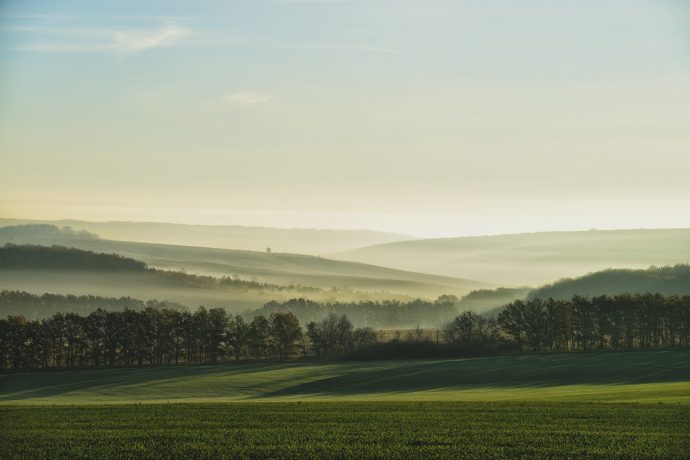In our backyard grows a milkweed plant, and it’s become a central play station for my kids. Milkweed is significant because it is the only food source for the monarch caterpillar. These beautiful arthropods crawl over and through our milkweed by the hundreds. Monarch butterflies play an important pollinator role in maintaining the fertility of many of our plant species; without them, plant reproduction would vastly decrease. We have begun to teach our children to care for these creatures with tenderness.
It all started when we first trimmed the milkweed and noticed all the caterpillars on the fallen leaves. We took careful attention to find and remove each one and place it back on the plant. My daughter, perhaps channeling her inner St. Francis, sings to and prays for the caterpillars and butterflies. At five years old, she knows that life—including plant and animal life—is a gift from God that must be cared for rather than destroyed. To put it another way, she intuitively understands that our relationship to other humans and to the earth itself ought to bring praise to God through practices that care for our common home and one another.
A few weeks ago, I went to a community forum on Hawaii’s changing climate, where representatives from the State Office of Environmental Quality Control and the Pacific Islands Climate Science Center presented. Like many Pacific Islands, Hawaii is uniquely situated to receive the brunt of the negative effects of a warming climate. Rising sea levels, coral bleaching, mosquito infestations, drought conditions, and increased storm activity already impact the Hawaiian Islands. It’s estimated that Waikiki will be under water within fifty years. Entire ecosystems are in the process of being dramatically altered. These changes affect human migration patterns (climate refugees), endangered species, and our own food production systems. For us in Hawaii, climate change is not a Big Bad Wolf to worry about a hundred years from now. The wolf is knocking on our door right now.
For many in the United States, our primary relationship to creation is not one of care but of domination. We live (often without thinking) according to the story of profit, consumption, and extraction rather than simplicity, stewardship, and connectedness. The former fits nicely into our economic comfort, while the latter better fits the story of God’s reconciling ends. Empires tend to destroy planetary life, and we have often neglected to treat land, water, and air as gifts from God rather than as commodities to be mastered, bought, and sold. As Christians, we need teachers to show us the way. We can learn from the wisdom of indigenous peoples who have historically and traditionally respected creation as a gift and have lived sustainably within her limits.
As a pursuer of this goal to learn from those who have cared for creation better than I have, I am drawn to the Standing Rock Sioux protests over the Dakota Access Pipeline. In North Dakota stands a visible witness of a people who seek to point to an alternative way to think about the earth. In an attempt to preserve sacred ground, protect their water source, and ward off further ecological degradation in the years to come, the Standing Rock Sioux nonviolently and courageously resist the Dakota Access Pipeline even while enduring freezing temperatures and facing police brigades armed with pepper spray, water cannons, and tear gas.
We have forgotten our connectedness; we have forgotten God’s call to stewardship.
These brave indigenous people, and those who have joined them, actually call us back to God’s original intent in gifting us this beautiful world to steward. God’s intent is wholeness, justice, righteousness, and harmony wrapped up in a community of self-giving love. In short, it is shalom. Randy Woodley, in his wonderful book Shalom and the Community of Creation: An Indigenous Vision, locates the story and dream of God in the harmony that exists between humans, plants, animals, and with God’s self. And during a time in which we have become so separated from the land, “The Creator is calling us back to experience God’s love and care in the created world around us. The indigenous people of our own lands are the guides and theological interpreters of this too-long-awaited journey.”
All humans are native to the land. It’s just that we have forgotten our connectedness; we have forgotten God’s call to stewardship and our place as one out of many of God’s created acts. This stewardship principle—that creation is a gift and not a commodity—is a shared principle between many traditions, including Christianity.
Within the Christian tradition, we are told to love God and love our neighbor. But we cannot love our neighbors well if we don’t also care for the land that gives us life.
Everything we eat depends on the health of our soil, streams, forests, and air. We are all dependent creatures, both on creation and the Creator. The indigenous people of the world are the ones leading the charge to break many of us free from our ecological amnesia. Their protests and principled resolve act as a means of grace to teach us a more faithful way. May we learn to listen.
Like my daughter singing to the caterpillars and praying for the butterflies, creation is a gift to be valued and cared for, not pillaged or plundered or taken for granted. We need new postures that are marked by thanksgiving, grace, wonder, and simplicity. May we cultivate these practices in our houses of worship as sincere acts of resistance against destructive forces.





1 Comments
Doug
Eric this was a nice read